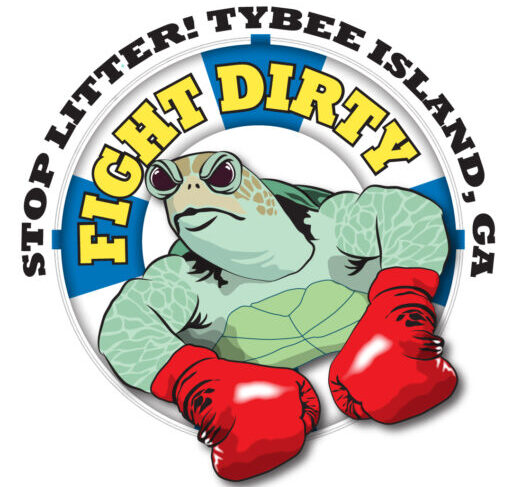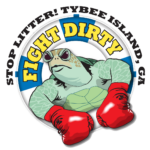The Tide: On Tybee, plastic trash gets a new use


For Tybee’s Tim Arnold, marine plastic is not some faraway scourge in the Pacific gyre. It hits home right on Tybee’s beaches.
Arnold organizes beach cleanups on Tybee where members of his “Fight Dirty Tybee” brigade pick up all manner of trash, most of it plastic. They recycle what they can but it’s not always possible. Take bottle caps and straws, for example.
“But I’ve got so many straws and bottle caps,” he said. “I’ve estimated over 100,000 bottle caps. It’s insane. Every beach sweep we’ll get 50 or more.”

So when Arnold came across a “portable mini plastic recycling machine” on the Internet, it piqued his interest. Fight Dirty Tybee bought one and now Arnold is creating small plastic pots and coasters in his garden shed using plastics that other communities typically landfill or burn.
The enormous quantity of plastic entering the ocean, estimated at 33 billion pounds a year, makes plastic production and pollution a top policy issue, along with fisheries and energy, for the international ocean conservation group Oceana.
“So that’s about the equivalent of two fully loaded dump trucks pulling up next to you at the beach and dumping into the ocean, every single minute,” said Paulita Bennett-Martin, the Savannah-based federal policy manager for plastics at Oceana. Bennett-Martin previously worked as the Georgia campaign manager for Oceana.
Funding for Fight Dirty Tybee’s $5,000 machine, which shreds, melts and molds the plastic, came from three-month long fundraiser aided by Salt Island Fish & Beer restaurant. The machine itself was shipped from Malaysia where an Australian family produces them to address plastic pollution there. The design is an open source one made available by its Dutch creator, Dave Hakkens, who offers user tips on his Precious Plastics videos.
For now, Arnold and his volunteers are using plastic from the “hard-to-recycle” collection bins at the Tybee YMCA. They’re sticking with polypropylene, which has a No. 5 inside its chasing arrows symbol. When they get the process down pat with this clean plastic they’ll incorporate more beach litter, which can be dirtier.
“The polypropylene is typically margarine tubs, cottage cheese tubs, black takeout containers,” said Arnold, who retired to Tybee after a career in finance. “Some of it is rigid, but most of it is somewhat flexible. It can be microwaved. So it’s just.. it’s in everything.”

He’s right. Polypropylene is one of the top three most commonly used plastics, but only about 1 percent of it is recycled, according to everydayrecycler.com.
Plastics have been found in remote places like the Arctic sea ice, Bennett-Marin said. Several studies of ocean water in Georgia have found tiny plastic particlesin almost every sample taken. The scope of the problem goes beyond litter and the solutions go beyond cleanups, she said.
“Cleanups are the front line; they provide a space for people to take action about the issue,” Bennett-Martin said. “But we cannot clean our way out of this issue, because of the amount of single use plastics that are being produced.”
Arnold knows this, and intends to use his machine and its products to educate and raise awareness.
Arnold and other volunteers sort the plastic into colors, mainly for aesthetics, then grind it into flakes. For each pot or coaster he then mixes the colors to his liking, adding white to lighten the shade or clear for extra sheen.
The machine heats the plastic to melt it. Arnold then pushes down a hand-held plunger to fill the steel mold. It cools in minutes and on this day out popped a black-and-blue trapezoid planter. A matching coaster followed to act as a saucer under the pot.
Arnold intends to make at least 100 sets to sell at the Tybee Island Farmers Market when it reopens in March.
Given the high temperatures, plastic fumes and knives involved in the process it’s not a participatory one for children. Or for all adults. It’s also slow, so it won’t reduce a large volume of plastic.
Bennett-Martin, who knew about Fight Dirty Tybee’s cleanups but not about their upcycling machine, agreed its main value is in educating. Oceana emphasizes that plastics are a climate problem.
“The production of plastics is really very important, right? Because plastics are a fossil fuel- based product. So they’re a heavy industry product. And then the production of plastics therefore contributes to greenhouse gas emissions. And so it’s a climate driver, the industry itself. We have this kind of comparison that if plastics was a country, it would be the fifth biggest greenhouse gas emitter on the planet. That’s how much we know that plastics is impacting us. And that’s before it ever becomes litter.

Tybee has anti-litter laws, voluntary initiatives for restaurants to quit offering straws and for shops to eschew disposable plastic bags. But they’ve barely made a dent in litter, Arnold said. So he’s already gotten creative in educating about plastic.
Previous educational projects include a display of thousands of cigarette butts, which contain plastic filters, in a clear orb at the Tybee Island Marine Science Center.The plastic recycler will similarly encourage people to consider the problem of plastic, he said.
“Because you know, the whole goal here was to remove plastic from the beach, turn into something useful and educate people about stopping it,” Arnold said.

